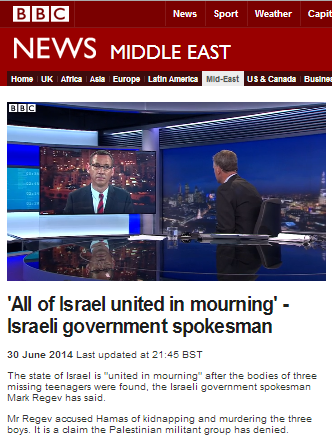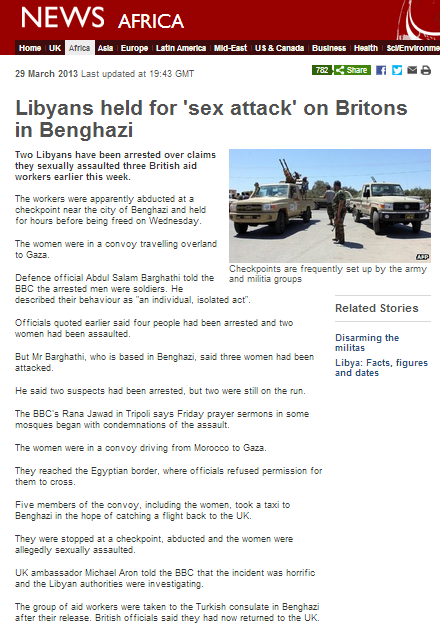One of the dominant and recurring themes apparent throughout all BBC coverage of the kidnappings of the three Israeli teenagers over the last two and a half weeks has been the downplaying of Hamas involvement in the incident.
Audiences were repeatedly told that Hamas denied any involvement in the abductions and cherry-picked statements from officials belonging to an internationally designated terror organization were presented to audiences as equivalent to Israeli statements based on intelligence and evidence from the field. Other comments by Hamas members which did not fit into the ‘boy-scout’ image were omitted from BBC coverage.
That editorial policy came to a climax in the BBC News website’s June 26th article on the subject of the ISA’s naming of the two main suspects in the case. There, the suspects’ known – and even self-declared – Hamas connections were downplayed to the level of ‘Israel said’, a carefully selected statement by Khaled Masha’al was promoted – whilst his others were erased from audience view – and Hamas’ history of instructing its operatives in the field how to carry out kidnappings was not even mentioned.
Had the BBC done a better job of reporting on this topic during the two and a half weeks prior to the discovery of the bodies of Gil-ad Sha’ar, Naftali Frenkel and Eyal Yifrach, then not only would its audiences be more adequately informed, but – crucially – also its own staff.
And had that been the case, then the presenter of a BBC television news programme who interviewed Israeli spokesman Mark Regev on June 30th (the interview was also promoted on the BBC News website’s Middle East page) might have been sufficiently well-briefed regarding the facts of an ongoing investigation so as to avoid the continued promotion of a futile and misleading editorial line rendered all the more ridiculous by the fact that, as would be the case in any country, Israeli officials are obviously not likely to share key intelligence with the media whilst an investigation is still in progress.
Mark Regev: “Well unfortunately, all of Israel tonight is united in mourning. We are mourning the three young teenagers who were brutally murdered by Hamas – by the Hamas terrorists. Unfortunately Hamas has shown us once again that they see every Israeli civilian – man, woman and in this case children also – as a legitimate target in their war of terror against Israel.”
Presenter: “What evidence do you have that it was Hamas that did this?”
MR: “It’s crystal clear. The people behind this are well-known Hamas activists from the city of Hebron. They don’t even deny that these people were involved. It’s clear that Hamas is behind this. Hamas has a history of kidnappings and murders. That’s why Hamas has officially been declared a terrorist organization, not just by Israel but by the United Kingdom, the European Union, Canada, the United States, Japan, Australia. So many countries who know Hamas have officially declared it a terrorist organization precisely because of its history of conducting these sort of operations.”
Presenter: “Hamas has denied being involved. The evidence you’ve just said is circumstantial.”
MR: “I disagree. I disagree. The information is clear and I think even Palestinian security people would confirm exactly what I’m saying.”
Presenter: “But I…I…I still can’t see the evidence upon which this assumption is based.”
MR: “When you know who the killers are and those killers are members of Hamas, so it’s clear that Hamas is behind the attack. I think that’s clear to anyone who looks at the facts objectively. I’d also remind you that Hamas leaders have openly praised and called for these sort of attacks. You can get out the BBC video file and you’ll see hundreds of examples of that.”
Did this presenter enable BBC audiences to become better informed about the subject to which this report ostensibly pertains by asking his interviewee a variety of questions which would help them understand the topic in general and the ongoing investigation in particular? No: instead he was far too busy indulging his self-styled Rumpole of the Bailey fantasy, sticking to one single topic and thus perpetuating an existing editorial line.




